all
Advanced Pharmacy Practice Experience: Community (6 credits)
The student gains experience in community pharmacy practice including, but not limited to, dispensing procedures, pharmacy law, practice management, and over-the-counter and prescription pharmacotherapy assessment. The student performs medication list retrieval, patient education, clinical documentation, and other patient care skills as appropriate for the rotation site. The student may be exposed to a variety of health care conditions, including but not limited to infectious diseases, disorders of coagulation, cardiopulmonary disorders, endocrine disorders, respiratory conditions, men and women’s health, and self-care pharmacotherapy.
Advanced Pharmacy Practice Experience: Hospital/Health System (6 credits)
This rotation provides the opportunity for the student to build on knowledge and skills acquired through didactic education and prior rotation experiences to apply to the care of patients within a hospital or health-system setting. The student is exposed to daily pharmacy operations as well as acute care of patients. The student may participate in a variety of activities, including but not limited to: medication list retrieval; providing education to patients and other health care providers; medication monitoring and dosing; clinical documentation; verifying the accuracy of prepared medications; and ensuring maintenance of operational procedures. The student also participates in activities related to medication safety, quality, administration, and drug policy.
Advanced Pharmacy Practice Experience: Ambulatory Patient Care (6 credits)
This rotation occurs in a variety of practice settings including, but not limited to, community retail pharmacies, hospital outpatient pharmacies, clinics, and physician offices. The student is an active participant on the interdisciplinary team and engages in activities involving the delivery of quality, comprehensive pharmaceutical care. These activities may include clinical care conferences, patient education and interviewing, drug therapy monitoring, developing and presenting care recommendations, physical assessments, point-of-care testing, and drug information questions. The student actively participates in in the health care decision-making process, especially as it pertains to drug therapy. The student may be exposed to a variety of health care conditions, including but not limited to infectious diseases, disorders of coagulation, cardiac disorders, diabetes mellitus, respiratory conditions, and self-care pharmacotherapy.
Advanced Pharmacy Practice Experience: Inpatient Care (6 credits)
This rotation occurs in an inpatient, acute care setting. The student develops and explores their roles in an interdisciplinary health care team and refines skills in pharmacotherapy, pharmacokinetics, drug information retrieval and evaluation, verbal and written communication, patient monitoring, and case presentation. The student applies didactic clinical coursework to the care of the hospitalized patient and actively participates in the health care decision-making process. The student encounters a variety of patient populations, including but not limited to, renal failure, infectious diseases, disorders of coagulation, cardiac disorders, diabetes mellitus, and respiratory conditions.
Advanced Pharmacy Practice Experience: Elective (6 credits)
These experiences allow the student to choose from additional available learning experiences to customize their education. Students may choose clinical, advanced distributive, or non-patient care rotations that enhance their professional understanding and broaden their capabilities. Rotation options include:
- Critical Care/ICU
- Emergency Medicine
- Infectious Diseases
- Compounding
- Admin/Leadership
- Pediatrics
- Academia/Research
- Nuclear Pharmacy
- Regulatory & Drug Policy
- Informatics
- Medication Quality/Safety
- Managed Care/Insurance
- Drug Information
- Hospice/Palliative Care
- Investigational Drugs
- Long-Term Care
- Specialty Pharmacy
- Pharmacy Associations
- Correctional Institutions
- Industry
- Psychiatry
- Veterinary Medicine
- International Pharmacy
- Cardiology
- Diabetes Management
- Geriatrics
- Neurology
- Oncology
- Surgery
- Infusion Therapy
- Advanced Pediatrics
- Indian Health Services
- Underserved Populations
- Rural Health
- Solid Organ Transplant
- Rehabilitation
- Medical Toxicology
- Disaster Management
- Transitions of Care
- Pain Stewardship
- Telehealth
- Population Health
PHAR 8000: Pharmacy Licensure Preparation (1 credit)
This year-long course focuses on the application and re-enforcement of principles taught previously in the Doctor of Pharmacy Program and emphasizes lifelong learning as students prepare to move from the classroom into practice.
PHAR 700 Personal & Professional Development (0 credits)
Activities and experiences that are purposely developed and implemented to ensure an array of opportunities for students to document competency in the affective domain-related expectations of approaches to patient care and personal and professional development. Co-curricular activities complement and advance the learning that occurs within the formal didactic and experiential curriculum.


